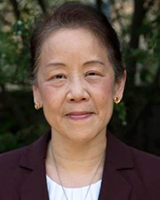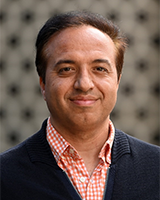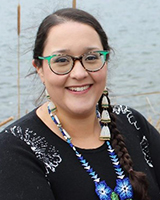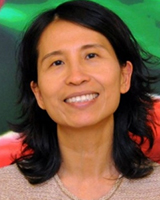IPPH Institute Advisory Board Members – Biographies

Elaine Hyshka (Co-Chair)
Associate Professor and Canada Research Chair in Health Systems Innovation, School of Public Health, University of Alberta
Scientific Director, Inner City Health and Wellness Program, Royal Alexandra Hospital
Dr. Hyshka completed a Master of Arts in political sociology and Certificate in addiction studies at the University of Toronto, prior to graduating from the University of Alberta with a PhD in health promotion and socio-behavioural sciences. Her scholarship is focused on advancing a public health approach to substance use in Canada. As the Scientific Director of the Inner City Health and Wellness Program she collaborates with affiliated clinicians, senior hospital leaders, and people with lived experience of substance use, homelessness, and poverty to implement and evaluate practice and policy changes designed to improve health outcomes, and advance health equity. Outside of the hospital, she conducts research and advocacy activities alongside service provider, non-profit, and government partners at local, provincial, and national levels. In 2017, she was appointed Co-Chair of the Alberta Minister of Health's Opioid Emergency Response Commission.

Professor Kelley Lee (Co-Chair)
Tier 1 Canada Research Chair in Global Health Governance, Faculty of Health Sciences, Simon Fraser University
Kelley Lee is Tier 1 Canada Research Chair in Global Health Governance and Professor in the Faculty of Health Sciences, Simon Fraser University, and previously Professor at the London School of Hygiene and Tropical Medicine. Trained in international political economy and public administration, her research and teaching focuses on collective action to mitigate globalisation’s impacts on population health. She led international efforts to secure access to British American Tobacco documents, and researched tobacco industry activities worldwide. She has been awarded Cdn$20 million in research funding to date from the NIH, CIHR, New Frontiers in Research Fund, European Research Council, Wellcome Trust, Rockefeller Foundation, ESRC and other funders. Her current research includes the commercial determinants of health, commercial tobacco control in BC First Nations communities, and compliance with the WHO International Health Regulations (2005) during the COVID-19 pandemic. She has served in several academic leadership roles including chair of a WHO resource group, director of a WHO collaborating centre, faculty head, and associate dean. She has published 200+ papers, 60+ book chapters and 15 books including co-editing the Oxford Handbook of Global Health Politics (2020).

Malek Batal
Professor, Department of Nutrition, Université de Montréal
Director, WHO-Collaborating Centre on Nutrition Changes and Development (TRANSNUT)
Malek Batal is a Professor at the Nutrition Department of Université de Montréal’s Faculty of Medicine and the Director of the WHO-Collaborating Centre on Nutrition Changes and Development (TRANSNUT). Malek holds the Canada Research Chair in Nutrition and Health Inequalities (CIENS) and is Fellow of the Royal Society of Canada and of the Canadian Academy of Health Sciences. He conducts participatory research studying the links between environment and food system health and population health, in an effort to redress health inequities. Equally important to scientific rigor is the relevance and usefulness of his research to society. This is why he collaborates as part of transdisciplinary research teams with First Nations in Canada and Indigenous and rural people internationally, prioritizing engagement with knowledge users from civil society and governments and putting his research findings at the service of public policy.

Linda Bauld
Bruce and John Usher Professor of Public Health
Co-Director, Centre for Population Health Sciences, Usher Institute, The University of Edinburgh
Cancer Prevention Advisor, Cancer Research UK
Professor Linda Bauld PhD OBE FRCPE FRSE FAcSS FFPH holds the Bruce and John Usher Chair in Public Health in the Usher Institute, College of Medicine at the University of Edinburgh. Linda is a behavioural scientist whose research focuses on the development and evaluation of complex public health interventions and the primary prevention of Non Communicable Diseases (NCDs) in the UK and further afield. Since 2014, she has combined her academic role with a secondment to Cancer Research UK (CRUK), the world’s largest cancer charity, as their Cancer Prevention Adviser. She currently leads two research consortia - the GCRF Tobacco Control Capacity Programme in Africa and South Asia, supported by UK Research and Innovation via Overseas Development Aid funding, and the SPECTRUM Consortium, involving teams in 10 UK Universities and partner organisations funded by the UK Prevention Research Partnership. She currently chairs or is a member of research funding and policy committees for CRUK, National Institute for Health Research, the Medical Research Council, the International Agency for Research on Cancer, Public Health England, Institute for Alcohol Studies and the Scottish Government. During the COVID-19 pandemic she has been a regular contributor to UK and international media on public health and currently serves as an adviser to Scottish Parliament on COVID-19 and post-pandemic recovery.

Eve Dubé
Research Scientist, Research Center of the CHU-Québec
Professor, Department of Anthropology, Laval University
Eve Dubé is a medical anthropologist. She is affiliated with Quebec National Institute of Public Health in Quebec, Canada. She is a research scientist at the Research Center of the CHU-Québec and a professor in the Departement of Anthropology at Laval University.
Her research program focuses on the sociocultural determinants of vaccination. She is the lead investigator of the Social Sciences and Humanities Network of the Canadian Immunization Research Network. She is interested in how to enhance vaccine acceptance and uptake and she is leading different projects around this issue. She sits on a number of provincial, federal and international committees as an expert on vaccine acceptance and hesitancy.

Mohammad Hajizadeh
Professor and Canada Research Chair in Health Economics
School of Health Administration
Dalhousie University
Dr. Hajizadeh is a Professor and Tier 2 Canada Research Chair in Health Economics at the School of Health Administration, Faculty of Health, Dalhousie University. He earned his PhD in Economics from the University of Queensland and has held postdoctoral positions at both Western University and McGill University. His research centers on the impact of social determinants on health outcomes and health equity. As the leader of the Health Equity and Policy (HEAP) research lab at Dalhousie University, Dr. Hajizadeh explores the complex realities of health inequalities in Canada and globally. His work is dedicated to shaping policies and implementing practical strategies to promote more equitable health outcomes and strengthen health systems.

Jessica Hopkins
Chief Health Protection and Emergency Preparedness Officer, Public Health Ontario
Dr. Hopkins is a public health and preventive medicine physician with extensive local and provincial public health experience. She is the Chief Health Protection and Emergency Preparedness Officer at Public Health Ontario where she leads a multi-disciplinary team in synthesizing data and evidence to provide advice to decision-makers on public health and infection control programs and policies.
Dr. Hopkins previously worked as the Medical Officer of Health for Peel Region, and Associate Medical Officer of Health in Hamilton and Niagara Region. She works as a family doctor and is an Assistant Professor (part-time) with the Department of Health Research Methods, Epidemiology, and Impact, McMaster University, and Adjunct Lecturer and member of the Institute for Pandemics with the Dalla Lana School of Public Health, University of Toronto.

Brittany Wenniserí:iostha Jock
Kanien’kehá:ka (Saint Regis Mohawk Tribe and Mohawks of Akwesasne)
Assistant Professor, Centre for Indigenous Peoples’ Nutrition and Environment (CINE), McGill University
Dr. Jock’s research focuses on the environmental and social determinants of obesity and related chronic diseases in First Nations and Native American communities. Her specific interests include developing culturally-appropriate obesity prevention programs, implementing and evaluating obesity prevention programs among Indigenous populations, and improving food environments using policy development and partnership with Indigenous governments and communities. Having grown up on the Kanien’kehá:ka (Mohawk) reservation of Akwesasne, she strives to promote health and wellness of Indigenous people. She attended Syracuse University for her bachelor’s degree, studying chemistry and mathematics. She received her master’s degree in epidemiology from the Johns Hopkins School of Public Health and received her doctorate degree from the Social and Behavioral Interventions program of the Johns Hopkins School of Public Health. Her dissertation research utilized both qualitative and quantitative methods to develop the Community Action Component for OPREVENT2 study, a multi-level multi-component obesity prevention program among six Native American communities in the Midwest and Southwest Regions of the U.S.

Andrew Pinto, MD CCFP FRCPC MSc
Director, Upstream Lab, MAP Centre for Urban Health Solutions, Li Ka Shing Knowledge Institute, Unity Health Toronto
Clinician-Scientist, St. Michael's Hospital
Associate Professor, Faculty of Medicine & IHPME & Dalla Lana School of Public Health, University of Toronto
Associate Director for Clinical Research, University of Toronto Practice-Based Research Network (UTOPIAN)
Dr. Andrew Pinto is the founder and director of the Upstream Lab, a research team focused on tackling social determinants of health, population health management, and using data science to enable proactive care. He holds the CIHR Applied Public Health Chair in Upstream Prevention. He is a Public Health and Preventive Medicine specialist and family physician at St. Michael's Hospital in Toronto and an Associate Professor at the University of Toronto. He is the Associate Director for Clinical Research at the University of Toronto Practice-Based Research Network, the lead for clinical research of Ontario's POPLAR network, and the founder of the Canadian Primary Care Trials Network. He serves on the Institute Advisory Board of CIHR's Institute for Population and Public Health, is an adjunct scientist at the Institute for Work and Health, and an honorary senior lecturer at St. Andrews University in Scotland.

Theresa Tam
Chief Public Health Officer
Public Health Agency of Canada
Dr. Theresa Tam was named Canada’s Chief Public Health Officer on June 26, 2017. She is a physician with expertise in immunization, infectious disease, emergency preparedness and global health security.
Dr. Tam obtained her medical degree from the University of Nottingham in the U.K. She completed her paediatric residency at the University of Alberta and her fellowship in paediatric infectious diseases at the University of British Columbia. She is a Fellow of the Royal College of Physicians and Surgeons of Canada and has over 55 peer-reviewed journal publications in public health. She is also a graduate of the Canadian Field Epidemiology Program.
Dr. Tam has held several senior leadership positions at the Public Health Agency of Canada, including as the Deputy Chief Public Health Officer and the Assistant Deputy Minister for Infectious Disease Prevention and Control. During her 20 years in public health, she provided technical expertise and leadership on new initiatives to improve communicable disease surveillance, enhance immunization programs, strengthen health emergency management and laboratory biosafety and biosecurity. She has played a leadership role in Canada's response to public health emergencies including severe acute respiratory syndrome (SARS), pandemic influenza H1N1 and Ebola.
Dr. Tam has served as an international expert on a number of World Health Organization committees and has participated in multiple international missions related to SARS, pandemic influenza and polio eradication.

Gaynor Watson-Creed
Assistant Professor, Department of Community Health and Epidemiology, Dalhousie University
Dr. Gaynor Watson-Creed is the Associate Dean of Serving and Engaging Society for Dalhousie University’s Faculty of Medicine, and an Assistant Professor in the Department of Community Health and Epidemiology. She is a public health specialist physician with 18 years experience, having served as the former Medical Officer of Health for the Halifax area and Deputy Chief Medical Officer of Health for Nova Scotia. Dr. Watson-Creed has an MD from Dalhousie University, an MSc from the University of Guelph, a BSc from the University of Prince Edward Island, and honorary doctorates from Acadia University and the University of Prince Edward Island. She also sits as chair or member of several national population health councils and boards, and is a passionate advocate for high-quality public health services and for anti-oppressive health care in Canada.
- Date modified: